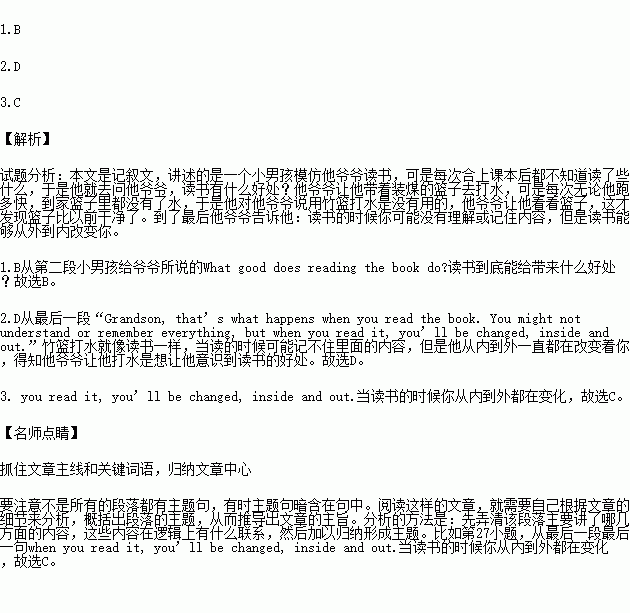题目内容
Each morning Grandpa was up early sitting at the kitchen table, reading his book. His grandson admired him, trying to copy him in every way he could.
One day the grandson asked, “Grandpa, I try to read the book just like you, but I don’t understand it, and I forget what I understand as soon as I close the book. What good does reading the book do?”
The old man quietly turning from putting coal in the stove and replied, “Take this coal basket down to the river and bring me back a basket of water.”
The boy did as he was told, but all the water leaked out before he got back to the house. The grandpa laughed and said, “You’ll have to move a little faster next time.”
This time the boy ran faster, but again the basket was empty before he returned. Out of breath, he told his grandpa that it was impossible to carry water in a basket, so he went to get a bucket instead.
The grandpa said, “I don’t want a bucket of water; I want a basket of water. You’re just not trying hard enough.”
The boy again dipped the basket into the river and ran hard, but when he reached his grandpa the basket was empty again. Out of breath, he said, “Grandpa, it’s useless!”
“So, you think it is useless? the grandpa said, “Look at the basket.”
The boy looked at the basket and for the first time he realized that the basket was different. It had been transformed from a dirty old coal basket and was now clean.
“Grandson, that’s what happens when you read the book. You might not understand or remember everything, but when you read it, you’ll be changed, inside and out.”
1.What puzzled the grandson most was ________.
A. why he forgot what he read soon
B. whether it was useful to read books
C. what kind of book he could understand
D. how he could read books like his grandpa
2. Why did Grandpa ask his grandson to fetch a basket of water?
A. To train him to run faster.
B. To clean the dirty basket in the river.
C. To punish him for not reading carefully.
D. To get him to realize the use of reading books.
3.What lesson can we learn from the story?
A. The old are always wiser than the young.
B. It is foolish to carry water with a basket.
C. Reading books can change a person gradually.
D. You can’t expect to remember whatever you read.
 捷径训练检测卷系列答案
捷径训练检测卷系列答案 小夫子全能检测系列答案
小夫子全能检测系列答案
